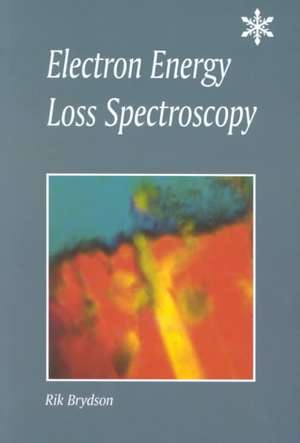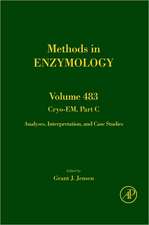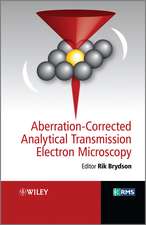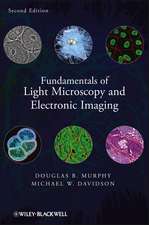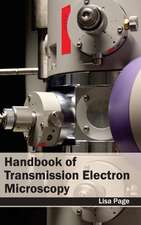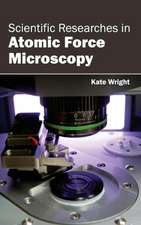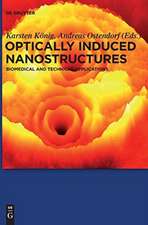Electron Energy Loss Spectroscopy
Autor R. Brydsonen Limba Engleză Paperback – 15 iun 2001
Preț: 661.75 lei
Preț vechi: 778.53 lei
-15% Nou
Puncte Express: 993
Preț estimativ în valută:
126.65€ • 131.71$ • 105.98£
126.65€ • 131.71$ • 105.98£
Carte tipărită la comandă
Livrare economică 15-29 martie
Preluare comenzi: 021 569.72.76
Specificații
ISBN-13: 9781859961346
ISBN-10: 1859961347
Pagini: 152
Dimensiuni: 156 x 234 x 9 mm
Greutate: 0.23 kg
Ediția:1
Editura: CRC Press
Colecția Garland Science
ISBN-10: 1859961347
Pagini: 152
Dimensiuni: 156 x 234 x 9 mm
Greutate: 0.23 kg
Ediția:1
Editura: CRC Press
Colecția Garland Science
Public țintă
Postgraduate and UndergraduateCuprins
Abbreviations -- Preface -- Acknowledgements -- 1. Introduction -- What is EELS? -- Interaction of electrons with matter -- Basics of the TEM -- Comparison of EELS in TEM with other spectroscopies -- Conclusions -- References -- 2. The EEL spectrum -- The primary transmitted electron signal -- Historical development -- Basic components of an EEL spectrum -- Basic physics -- Summary of analytical uses -- References -- 3. EELS instrumentation and experimental aspects -- The electron spectrometer -- Coupling a magnetic spectrometer to the microscope -- Spectral recording -- Energy-filtered imaging -- Choice of experimental conditions for EELS -- Specimen parameters -- Summary of experimental set-up and data acquisition procedures for EELS -- Summary of data correction procedures for EELS -- References and further reading -- 4. Low loss spectroscopy -- Quantification of sample thickness -- Quantitative aspects of low loss data -- Experimental aspects of EELS low loss measurements -- Conclusions -- References and further reading -- 5. Elemental quantification -- Quantification of EEL spectra -- Background removal -- Determination of the ionization cross-section -- Final quantification step -- Summary of the quantification procedure -- Summary of experimental quantification parameters -- Accuracy and detection sensitivity of EELS quantification and comparison with EDX in the TEM -- References and further reading -- 6. Fine structure on inner-shell ionization edges (ELNESIEXELFS) -- Origin of edge fine structure -- Determination of coordinations -- Determination of valencies -- Determination of bond lengths -- Experimental aspects of ELNESIEXELFS measurements -- Conclusions -- References and further reading -- 7. EELS imaging -- Introduction to EELS imaging and energy filtering -- Summary of energy-filtering techniques -- Procedure for EFTEM elemental mapping -- Experimental parameters in EFTEM -- Correlation of elemental maps -- General strategy for EFTEM elemental analysis -- Experimental procedure for EFTEM image acquisition and processing -- Comparison of EFTEM and spectrum imaging methods -- Energy-filtered tomography -- Conclusions -- References and further reading -- 8. Advanced EELS techniques in the TEM -- Orientation dependency in EELS -- Spatially resolved measurements -- Electron Compton scattering -- Reflection mode and surface measurements -- References and further reading -- 9. Conclusions -- Further reading -- Further resources -- Index.
Notă biografică
Rik Brydson is a reader in Materials Characterization in the Materials Department at the University of Leeds in the UK. He has extensive experience of the application of microanalysis, particularly EELS, to a large range of chemical, physical, geological and materials problems.
Recenzii
'The real strength of this book shines through on the many experimental details, where the author writes with great authority...the wide use that I anticipate for his book will be well deserved.' - Journal of Microscopy
'As a clearly written introduction to the EELs technique, this 48th handbook is a winner.' - Bulletin of Microscopical Society of Canada and MICRON
'As a clearly written introduction to the EELs technique, this 48th handbook is a winner.' - Bulletin of Microscopical Society of Canada and MICRON
Descriere
Electron Energy Loss Spectroscopy (EELS) is a high resolution technique used for the analysis of thin samples of material. The technique is used in many modern transmission electron microscopes to characterise materials. This book provides an
